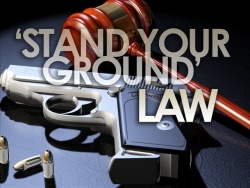The “Stand your Ground” law in South Carolina is one of the most highly covered legal topics in the media. Unfortunately, it is also one of the most misrepresented and misunderstood legal theories reported. Many people believe that “Stand your Ground” and “self-defense” are the same legal defense theory but they are not and understanding the difference between them is vital to an effective defense.
So what is “Stand your Ground” and how does it apply when a person meets force with force, including deadly force.
What does “Stand your Ground” protect you from?
The law provides that if a person is acting lawfully in protecting themselves, they can do so without fear of criminal prosecution or civil action.
That’s huge, the government can’t prosecute you and an individual is barred from bringing a civil claim for money damages against you if you are successful in your stand your ground argument.
Where does “Stand your Ground” come from?
Although the statute in South Carolina is titled the “Protection of Persons and Property Act” most media outlets and the public in general refer to the statute as “stand your ground,” that particular phrase is stated in §16-11440 (C):
A person who is not engaged in unlawful activity … has no duty to retreat and has the right to stand your ground and meet force with force …
Does “Stand your Ground” apply before trial?
In State v. Duncan, the South Carolina Supreme Court answered this question with a YES. However the answer was not immediately apparent. When the Court looked to the statute for guidance it found that the law did not provide a procedure for determining immunity.
To reach its conclusion the Court cited Black’s Law Dictionary definition of “immune” to mean being “exempt from a duty or liability,” and “Prosecution” as “a criminal proceeding in which an accused person is tried.” Simply stated, immunity shielded a person from a full-blown trial.
However, whether immunity should be determined prior to trial was an issue of first impression, meaning the court had not decided this before in South Carolina. Unfortunately the statute did not provide a procedure for determining immunity so they looked at several other states that addressed the issue with similar immunity statutes.
In Georgia, the plain meaning of “immune from prosecution” is a bar to criminal proceedings and that this determination must be made before the trial commences.
Under Florida law, the plain language of the statute grants defendants a substantive right to assert immunity from prosecution and to avoid being subjected to a trial. Where a defendant files a Motion to Dismiss based on Florida’s Stand your Ground law the court should conduct a pre-trial hearing to decide if immunity applies.
Decision: South Carolina views “immune from prosecution” as a true immunity and not simply an affirmative defense, therefore it is a complete bar to prosecution and, upon motion of either party, must be decided before trial.
What’s the Standard of Proof?
This was also a novel issue in South Carolina until this Duncan. Again the Court looked to Florida and adopted the standard used there that the court must determine whether the defendant has shown by a preponderance of the evidence that immunity attaches.
Stand Your Ground is not Self-defense
It’s vital to anyone facing criminal prosecution that they retain a lawyer who understands that “self-defense” and “Stand your Ground” are not the same. Importantly, they are two separate and distinct legal theories and understanding the differences is vital in your defense. An example of these differences is that self-defense is not decided prior to trial and a person asserting this defense has a duty to retreat under certain circumstances; “Stand your Ground” does not require a duty to retreat.
Where does Stand your Ground apply?
The doctrine extends not only to a persons home but includes a vehicle and place of business. A person’s dwelling includes areas such as an attached porch, tent that is designed to be occupied by people lodging there at night.
In order to have the benefit of the immunity a person must not be involved in unlawful activity.
On the street: a person who is attacked in another place where they have a right to be has no duty to retreat and has the right to stand his ground and meet force with force, including deadly force, if he reasonably believes it is necessary to prevent death or great bodily injury to himself or another or top prevent the commission of a violent crime defined by statute §16-1-60.
Where does Stand your Ground not apply?
A person is not immune from prosecution if the person:
- Uses deadly force against a person that has the right to be in the residence;
- Or is a lawful resident of the dwelling, occupied vehicle (including owner, lessee or titleholder);
- The person sough to be removed is a child or grandchild, or unlawful custody or under legal guardianship, of the person against whom deadly force is used;
- A person who uses deadly force is engaged in unlawful activity or using the home, vehicle for unlawful activity;
- Deadly force used against a law enforcement officer who enters a home in his official duties and identifies himself in accordance.
Criminal defense attorney Charleston, SC
Do you want to know if “Stand your ground” will be a defense in your case? Call an experienced and trusted Charleston criminal defense lawyer at the Dale Savage Law Firm today for a free case consultation (843) 530-7813.

